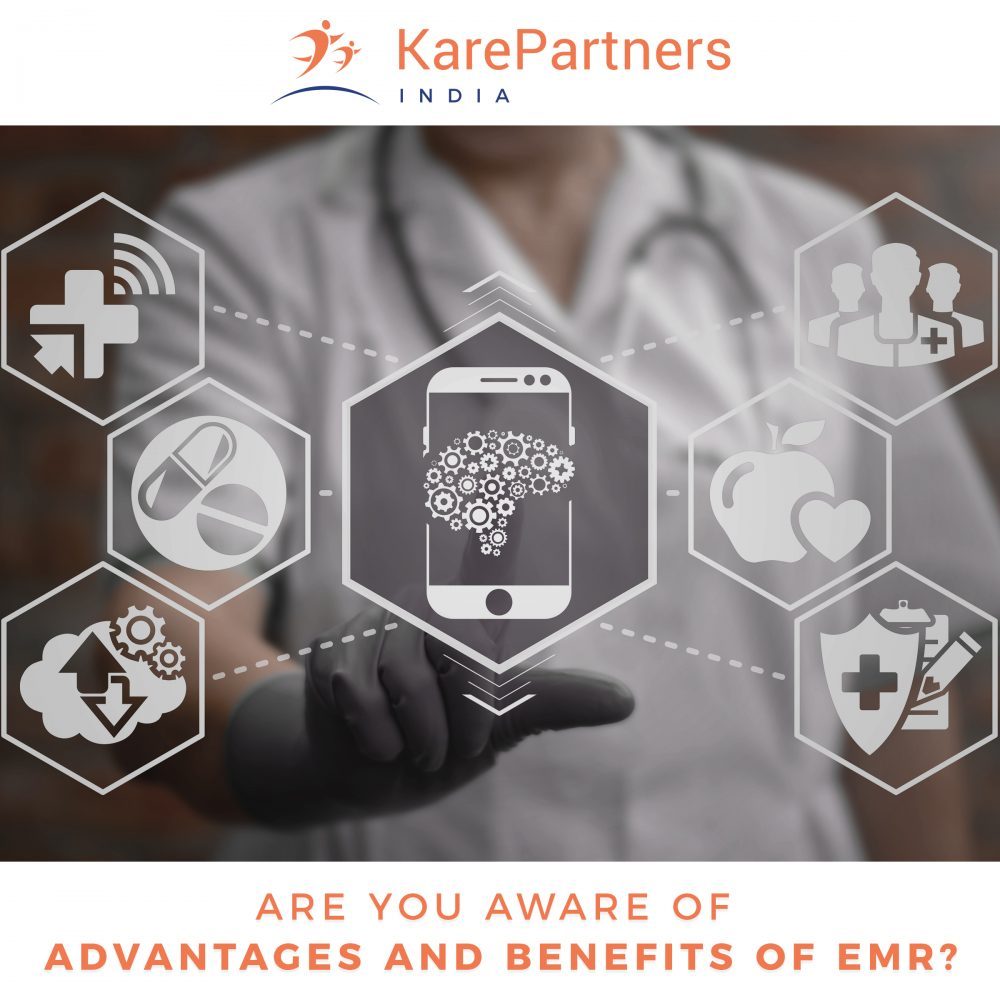ARE YOU AWARE OF ADVANTAGES AND BENEFITS OF EMR?
INTRODUCTION
The full form of EMR is Electronic medical record, which is parallel to paper records, or charts digitized on computer at a physician clinic. They have general information about patient’s medical treatment, medical history as its collection is done by any medical person in the hospital.
Formerly in the healthcare industry, health care professionals have advanced in progressive diagnostic equipment but when it comes to keeping track of patients health histories, clinicians & hospitals still depend on on paper & pen. Currently, paperwork gets transformed into a complete system of EMR’S by huge medical game players to improve patient care.
HISTORY OF EMR
Electronic Medical Records started long back, they were started in 1960 as a part of hospital management to process data in hospitals. Officially electronic medical records were introduced in 1972 by RegensteinInstitute, but due to advance traction the notion failed, in spite of recognition in 1991 by the Institute of Medicine. It wasn’t until Congress approved the HIPAA law in 1996 that the industry turned to electronic medical records to fulfill with provisions in the act.
Today, conferring to the Office of the National Coordinator for Health IT, about 83% of all health practitioners have adopted an Electronic health Records in their practices.
There are various modules in Electronic medical records such as:-
Ordering labs, patient demographics, billing, support system, imaging tests, management of medicines etc.
SAFETY OF PATIENT AND EMR
When it comes to patients’ diagnosis and safety of medical records, the software companies design software in a way that it keeps patients record safely and usually it is the most important component of medical record software .The reduction in errors proves to be very beneficial for both physician and patient.
An electronic medical health records are ground for info allocation within a health practice logically decreases undesirable hand recorded errors. The issue of lost or misplaced patient records is also excluded.
These benefits of Electronic Medical Records help yield a noticeable upsurge in the health alliedsecurity of patients and patient prosperity.
In addition, EMR system and patient care are same in that such systems easily allow restraints to be placed upon end users’ access to specific patient data.
This particular safety feature is also significant in meeting a patient’s privacy concerns.
ADVANTAGES/BENEFITS OF EMR’S
1. It improves patients safety and security of records, also decreases chances of errors.
2. Productivity increases with improvement in revenue generation.
3. It avoids errors due to illegible handwriting.
4. It improves flexibility in the hospital.
5. It improves patient medical effects.
6. It enhances coordination among practitioners.
7. It increases quality of care
8. Helps to measure patients contrary to benchmark parameters.
CHOICING RIGHT SYSTEM
Contemplate these key issues when determining what kind of system is best suited to your clinic.
· Government certification: keep in mind that whatever product you receive should have government certification.
· Discrete or united system: Contemplate whether to partner with anybody or do it individually. Local hospital systems may offer practice of their Electronic Medical Record for a minimal charge, but rare have ophthalmic-ready systems. A healthier selection might be to segment the price of the IT system or bargain jointly with another nearby practice when dealing with the EMR merchants.
· Customization requirements: When assessing a system, regulate the level of customization required. Does Electronic Medical Record mimic the workflow or practice design? Do the things within the Electronic Medical Record represent all the fortes within the practice?
· Direct view: Visit coworkers who have effectively applied a system to comprehend what their actual experience have been.

FUTURE OF EMR’S
To successfully manage the abundance of information (and the request for information anywhere, anytime), healthcare administrations shouldemphasis on data availability and alliance in the coming era for fact-based decision-making. Here are some tendencies the productiveness can assume:
• Extended electronic allocation: As more health care professionalsescalate the expediency of contemporary communication tools and dataallocation, and more suppliersidentifies the advantages of conceding patients access to their own medicalevidences, electronic allocation will become the standard rather than the omission.
• Sustained contract of health Information Technology: Hospital adopting electronic medical records has doubled since 2009.
• Better information system development: The need to competently gather, practice, establish, monitor, distribute, and dispose data will only upsurge as acceptance of information system extents. Data and information running companies will play vital role in serving providers exploit what’s gathered and cut down on data excess.
• Improved pervasiveness of combined care models: Combined care models treats the individual and the family through the teamwork of medical and mental health professionals, it will further increase the popularity by using information sharing to attain high-quality care with lower prices.
Get ready for Variations in Information Management
Healthcare professionals live in a hybrid communication setting — perilous data is still delivered on paper, even as documents have become digital. Though it may take time to transform the industry, healthcare professionals can take these 3 steps to formulate for the future:
1. Employ a data group. Operational data systems require a devotedindividual or team to manage and convert data into valuable tools for healthcare providers. Construct a team that can make simple procedures to ensure organization’s data management for long term.
2. Develop a plan for data management-Choose how your hospital is going to handle an upsurge in data.Contemplate where data is going to originate from, its usage, how data is going to be reported, and who is going to access it.
3. Fixcriterions. Information quality affects the whole decision-making process in today’s health scenario, yet every hospitalfights with bad or surplus data, estimating 10–20% in revenue. Computerize the way information is collected and assessed to remove redundancy. Makeprinciples to measure the consistency of data.
CONCLUSION
Improvements in technology, largeinformation and itsallocation will bring about noteworthy changes in healthcare and information management. Now a day’sattractiveness of data-driven healthcare and combined care models will only upsurge in the upcoming years, healthcare administrations should start acting in a direction of efficient information management for upcoming years.
REFERENCES
· https://www.usfhealthonline.com/resources/key-concepts/what-are-electronic-medical-records-emr/
· https://www.revenuexl.com/resources/what-is-electronic-medical-record-emr
· https://www.micromd.com/emr/advantages
· http://triotree.com/blog/electronic-medical-record-definition-benefits-in-hospitals/
· http://www.himssfuturecare.com/blog/beyond-emr-future-data-management-healthcare
· https://consultqd.clevelandclinic.org/electronic-medical-records-the-future-is-now/


